#fukusaku
Explore tagged Tumblr posts
Text
Heyo there!
This post contains the guidelines for this year's "MultisakuMonth" event; go for it!

Ok then, right now we see the couples that were chosen at random in a stream we had on Facebook:

-

-

-

-

-

Here there are many new pairings and others already known, they will be quite a challenge but I'll give my best! (In addition to humbly requesting your support c:)
Finally, here are the latest details and guidelines that I have deemed appropriate:

Thank you very much for reading all this and good luck if you want to participate, good luck and see you in August!
#sakuharem#multisaku#sakura haruno#multisakumonth2024#sakura uchiha#qinsaku#raysaku#narusaku#harusaku#minasaku#konisaku#yamisaku#sakulin#sasosaku#itasaku#tonesaku#ikkisaku#katasaku#madasaku#tamasaku#fukusaku#mitsaku#zorosaku#tokisaku#kyosaku#korrasaku#uzuisaku#mikosaku#jamessaku#drasaku
71 notes
·
View notes
Text
Wait, so you're telling me that Jiraiya could've at least attempted to flea and regroup/mull over the intel he had already, but instead he decided to die??
#forgive me certain parts of shippuden i don't remember well#fukusaku and shima (mum and pop frog) were telling him to gtfo too#but i mean hey we need some people to die so....#jiraiya#fukusaku#shima#uchiha-gaeshi's rewatch#uchiha-gaeshi ramblings#naruto#naruto shippuden#txt
6 notes
·
View notes
Text
day 3 'fairytale' w/ sakufuku/fukusaku as snow white (and the 7 cats)

a chance encounter with a strange boy in the forest, a lost prince, and some magical cats...prince kiyoomi is lead to the missing prince shouhei, who lies asleep after being bitten by a snake, saved by seven cats to not perish to the poison, just a little nap.
good thing a prince is here, will it be true love's kiss that breaks the curse?
9 notes
·
View notes
Text

Naruto Shippuden Chapter 430
Naruto Returns
26 notes
·
View notes
Text










Black Lizard (1968), dir. Kinji Fukusaku
15 notes
·
View notes
Text
« Avez-vous déjà tué votre meilleur ami ? » (Battle Royale)
Note au lecteur : Avant d'entrer dans la présentation de ce film, je tenais à préciser qu'il a été à sa sortie interdit au moins de seize ans lors de sa sortie dans l'Hexagone, en effet Battle est un film d'horreur japonais, mais il ne s'agit pas d'un film d'horreur typique, car non ! Ce n'est pas de ce type de film où les pulsions interdites sont censurées. Non, ici les pulsions des personnages se développent à cause de leur égoïsme. Dans ce film, nous sommes confrontés à un monde cruel, révélant dans la noirceur des âmes.
dailymotion
« Japon, début du 21ᵉ siècle, le chômage et la délinquance explosent. Pour rétablir l'ordre, le gouvernement désigne au hasard une classe de trente lycéens chaque année et les soumet à une loi : Battle Royale. »
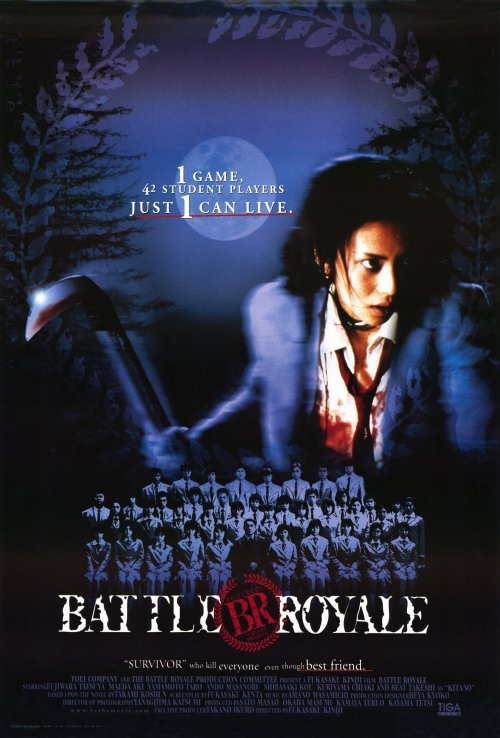
Battle Royale est donc un film sorti au début du nouveau millénaire, en 2000 pour être précise. Produit par Kinji Fukasaku (1930-2003) aux studios Toei Animation, il est issu du roman éponyme de Kōshun Takami paru en 1999. Ce film est avant d'être un film d'horreur, une dystopie — communément nommé un film d'anticipation — si cela est plus clair pour vous, mais aussi d'action. Ce film est à mes yeux un film d'horreur du cinéma japonais plutôt bon, même si certaines scènes sont grotesques.
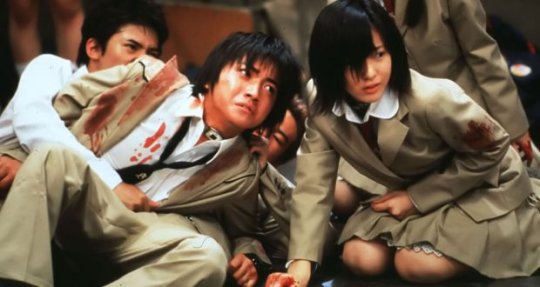
Venons-en désormais au scénario de film : dans un Japon ayant subi sans aucun doute une crise économique sans précédent entraînant une augmentation du chômage de 15% -soit un million de personnes sans emploi – accompagné d'une rébellion de quatre-vingt mille élèves qui ne se rendirent pas à l'école en raison de la perte de confiance en soi des adultes entraînant la peur des jeunes. Pour rétablir l'ordre chez les jeunes, le gouvernement vota la « loi B • R » — abréviation du terme Battle Royale – donnant son nom au « jeu » auquel les élèves sélectionnés une fois par an participeront. La classe est par ailleurs choisie parmi toutes les classes de Terminale du Japon — dans le film, il s'agit des élèves de la Terminale du lycée de Shiroiwa, il s'agit d'un lycée bien évidemment inventé —.
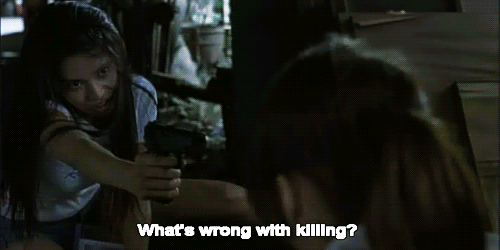
Jusque-là, rien ne semble encore trop étrange, mais passons maintenant aux règles énoncées dans les articles de la « loi B • R ».
Le but du jeu qu'est Battle Royale est de former une nation saine de corps et d'esprit et s'applique à toute la population sans aucune distinction.
Durant le temps de jeu étalé sur trois jours, les participants devront se battre dans la joie et la bonne humeur, s'amusant avec combattivité et appréciant leur chance immense de pouvoir participer à un tel jeu. Le refus de participation est interdit et toute tentative d'entraver le jeu sera puni.
Il est également à noter que les participants sont exempts de toute punition judiciaire et se voient donc autorisés à tuer, provoquer des incendies, se servir d'armes de toute nature — poisons et matières médicamenteuses comprises —.
La seule chose intéressante est que le gagnant aura sa vie future entièrement financée par l'État japonais et, sera considéré comme un citoyen modèle, exemple à suivre pour former la nation saine de corps et d'esprit.
Battle Royale est donc un survival où quarante-deux jeunes vont devoir s'entretuer dans la joie et la bonne humeur comme le dit la présentatrice des règles du jeu.
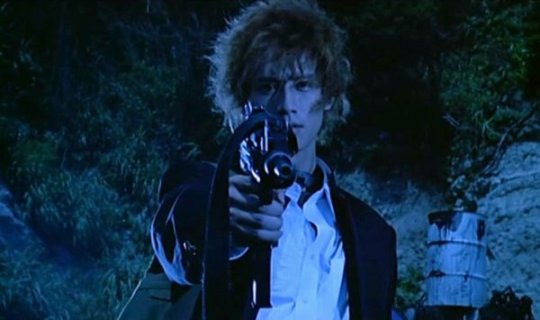
Dans les quarante-deux personnages, certains prennent plus d'importance que d'autres.
Prenons par exemple les deux personnages les plus âgés, Kawada Shōgo et Kiriyama Kazuo qui créent un manichéisme trop important dans le film.
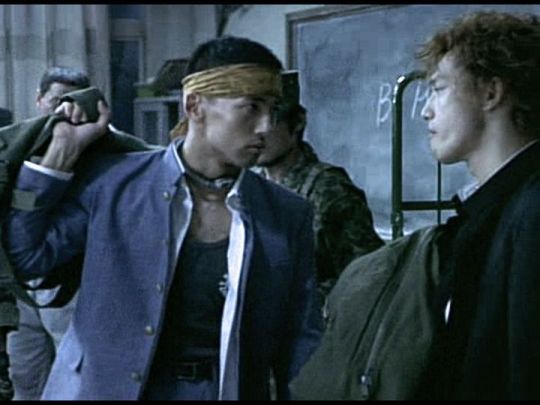
Kawada Shōgo, gagnant d'une édition précédente de Battle Royale et engagé volontaire, porte des vêtements assez clairs, à gauche sur l'image ci-dessus, est contre le jeu. Il est de ce fait le symbole du bien. Il se révèlera d'ailleurs être plutôt sympathique alors que Kiriyama Kazuo, à droite sur l'image, possède des habits noirs et a toute l'allure du méchant. Ce dernier est par ailleurs une vraie machine à tuer et s'est inscrit à Battle Royale pour le plaisir de tuer des gens.
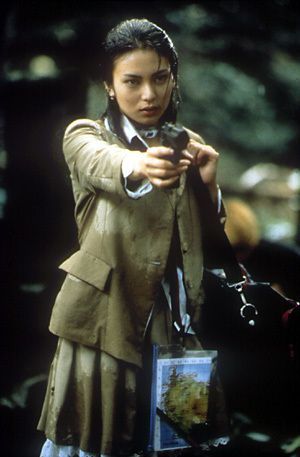
Nous avons par ailleurs le personnage de Souma Mitsuko qui se révèlera être la fille la plus sanguinaire, mais aussi l'une des plus machiavéliques de l'intrigue, prête à tout pour survivre au jeu.
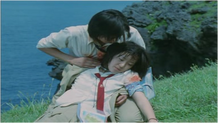
Viennent ensuite Nanahara Shūya et Nakagawa Noriko – image ci-dessus – deux amis qui resteront ensemble durant le film et seront rejoints par Kawada.
Pour conclure cet article, passons à la partie de la critique réalisée selon mon point de vue sur le film, donc des plus subjectives.
J'ai été, la première fois que j'ai visionné ce long métrage, agréablement surprise. J'avais en effet déjà regardé des films d'horreurs japonais et coréens du même genre et je les avais trouvés complètement tirés par les cheveux, ce qui est moins le cas pour Battle Royale : le film a un scénario qui tient la route.
Le film aborde comme thème principal le passage de l'adolescence à l'âge adulte et reste assez réaliste dans la société actuelle. Lorsque nous sommes enfants, nous sommes tous (à quelques exceptions près) amis pour la vie, puis lorsque nous grandissons, nous cherchons à devenir les meilleurs, élimant les plus faibles qui ne tiendront pas selon le système élitiste demandant toujours plus de sacrifices dans lequel nous nous trouvons. J'espère toutefois que personne ici n'a jamais tué un de ses amis pour rester supérieur à lui.
De plus, le thème du passage à l'âge adulte est également montré par la relation entre les adultes et les enfants. Les adultes cherchent à museler leurs enfants afin qu'ils pensent de la même manière qu'eux.
J'ai personnellement vécu cette situation, ayant été élevée par mes grands-parents, ma grand-mère en particulier qui, jusqu'à sa mort, trouva toujours quelque chose à me reprocher et ne fut jamais satisfaite de moi pour toute une liste de raisons que je n'énoncerai pas ici.
Passons maintenant au jeu d'acteur qui n'est pas mauvais, mais n'est pas parfait non plus, surtout dans les scènes de morts où tout est un petit peu surjoué — remercions tout particulièrement le côté épique demandé par le kabuki – et où il y a un peu too much de sang, certainement dû au petit budget du film.
Certains acteurs comme Tarō Yamamoto – acteur de Kawada – et Masanobu Andō – acteur de Kazuo Kiriyama – jouent particulièrement bien et ont des personnages intéressants, bien que très clichés, mais cela est malheureusement loin d'être le cas pour tous qui ont pour la plupart des personnages plats dont on ne sait pas grand-chose. Nous n'avons donc que quelques informations sur le personnage de Kawada, Kazuo et Nanahara Shūya mais cela ne leur donne malheureusement pas plus de profondeur.
Il est toutefois à noter que le film ne disposait que d'un petit budget et que par conséquence, il ne pouvait pas faire des miracles.
Attaquons-nous aux dialogues qui sont parfois étranges, cela en particulier dans la version française du film, entraînant des moments grotesques et grandiloquents, provoquant des fous-rire pour certains.
Pour conclure cette critique... Disons que le film peut être sympathique lorsqu'on le regarde quand nous sommes des adolescents, mais aujourd'hui, à vingt-cinq ans, j'ai beaucoup plus de mal à le trouver intéressant.
C'est donc un film pour les adolescents en rébellion. Je ne comprends par ailleurs pas sa classification comme film d'horreur et l'interdiction au moins de seize ans à sa sortie dans les salles.
2 notes
·
View notes
Text

- MultiSaku Month 2024 -
Día 16: FukuSaku
✨ Fukuzawa Yukichi × Sakura Haruno 🌸
#multisaku#multisakumonth2024#sakuharem#sakura haruno#sakura#naruto shippuden#multisakuday16#bsd fukuzawa#fukuzawa yukichi#bungou stray dogs
45 notes
·
View notes
Text

This might be slightly counter to what I usually read but I think Riho left at the perfect time. With MM’14 she’d perfected what Riho in MM could do and the only way to get better is to find a new environment. In contrast to that, sad to say but I don’t think Ayumi had a purpose in MM other than being Riho’s dance partner and should have been long gone. The best time was when 13th gen came in 2016. By then it’s clear she couldn’t find a new niche and Kaede would have been less wasted in the group taking over some of Ayumi’s lines. I’m not sure why Kaede was so focused on Fukumura in particular because with her vocal timbre she was never going to replace Fuku. I wouldn’t have minded Fuku staying until the HP 20th anniversary stuff is done, to be generous, because it’s true girl didn’t get much to do until she became leader. Rest of 10th gen was fine. They clearly knew that they weren’t meant to hang around MM forever. And Eripon gets a pass because I don’t notice if she’s there or not either way. Additional comment on Fuku and Oda (forgot about her). I feel Fuku really went off the rails after becoming HP leader. To an HP wota like her it probably isn’t that different from being declared queen of the universe and seemed to have gone to her head. Plus Harunan wasn’t around to do the talking to prevent Fuku’s foot in mouth moments. Leaving just after Riho came back for Hinafes’19 would have been perfect. Oda’s sort of like Ayumi in that she’s the designated partner of whomever the main singer is, RihoSaku, MaaSaku, FukuSaku and so forth. Best time for her to leave is about a year or two after the above three as transition, like the 2012-13 Reina/Riho lead period. So fingers crossed end of 2025 or this is going to drag on forever.
#morning musume#sayashi riho#kaga kaede#fukumura mizuki#ishida ayumi#ikuta erina#oda sakura#sato masaki#hello! project#hello!project
14 notes
·
View notes
Text
Shinzo (2000) 爆裂战士マシュランボー
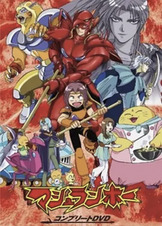
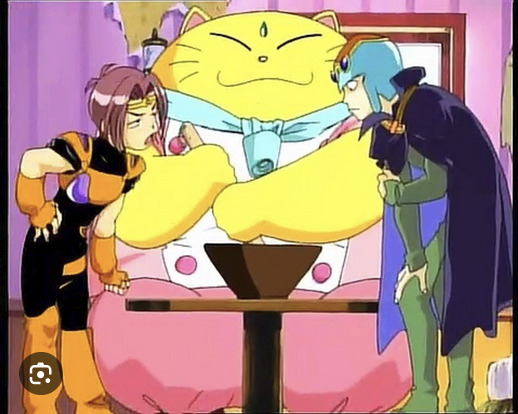
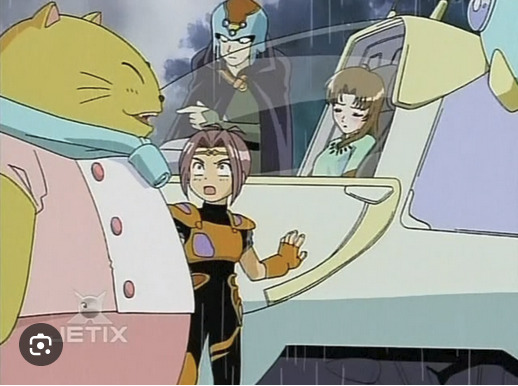

Director: Tetsuo Imasa / Kenji Nakamura / Haruo Kosaka / Toshiaki Komura / Miyo Sasaki / Mitsuo Hashimoto / Tomoharu Arata Edited by: Izumi Higashido / Makoto Kanjima / Kenichi Kaneka / Hiroyuki Kawasaki / Yukito Nonaka / Kenichi Yamada / Yōmichi Shirai Starring: Minami Takayama / Yuko Minakuchi / Yasuhiko Kawazu / Naosuke Tatsuta / Atsushi Kashiwagi / Kyoko Yamada / Ai Maeda / Tsuyoshi Hisakawa / Atsushi Kashiichi / Tomoe Sato / Junko Shimakata / Michitaka Kobayashi / Hideyuki Hori / Kenji Utsumi / Takashi Nakao / Mami Koyama / Toshio Furukawa / Keiko Han / Hiroo Egawa / Takeshi Aono / Banjo Ginga / Takashi Koda / Koji Fukusaku / Kazuko Sugiyama / Takumi Yamazaki / Horinoku / Nobutake Tatsuya / Tomohisa Aso / Norio Tsukui / Ienaka Hiroshi / Chie Seguchi / Hitoshi Domon / Akira Tahara / Kazuya Ichijo / Masaya Takatsuki / Masaharu Sato / Mitsuo Iwata / Keiko Yamamoto / Kunihiko Yasui / Hikaru Midorikawa / Mami Kanazuki / Hisaya Suganuma / Chigusa Ikeda / Hiromi Konno / Daisuke Nari / Yuko Nagashima / Nobuo Satouchi / Daifumi Tanaka / Naosuki Imamura / Takayuki Inoue / Akiki Chatan / Munehiro Ehoku / Rie Aoki / Yo Murakami / Tsuyoshi Nishi / Tsuyoshi Toshita / Higashi Genre: Animation Official website: www.toei-anim.co.jp/tv/mashura/ Country/Region of Production: Japan Language: Japanese Date: 2000-02-05 (Japan) Number of epsiode: 32 Also known as: Mushrambo IMDb: tt0293741 Type: Reimanging
Summary:
In the distant past, the Guardian of the Milky Way galaxy named Lanancuras began to harbor a desire for more power. Because of his connection to the galaxy, he was able to absorb parts of planets and add them to his strength. As a result, he began invading the worlds he was assigned to protect. In the wake of his destruction, a following of creatures from across the galaxy pledged allegiance to Lanancuras and became known as the Kadrians. Taking notice of his ever-growing power and followers, the other Celestial Guardians confronted him; however, he had become too powerful, and they were defeated. Unable to subdue Lanancuras, the Celestial Guardians each gave up a part of their power and combined it into a single new Guardian, Mushra. In a final desperate attempt, they used Mushra's core by transforming it into a powerful card with which to seal Lanancuras in a prison. The prison was created from the remains of planets that had suffered under Lanancuras' tyranny. Because planets are themselves large beings, their combined strength (along with the power of the card) was able to restrain him. Thus Lanancuras was successfully sealed in a large meteorite.
The meteorite was sent off into the galaxy to be sealed forever. Meanwhile, the way Lanancuras had increased his strength had consequences on the planets of the Milky Way On Earth, around the 22nd century, it was in the shape of a virus that merged with human DNA and destroyed the humans that way. In order to eliminate the virus, scientists worked on combining human DNA with the DNA of animals and other creatures immune to the effects. They succeeded and created a sentient race known as Enterrans (a race of engineered Earthlings) which are based on humans, insects, reptiles, birds, sea creatures, wild beasts, and phantom beasts. Eventually, a cure was found and the human race survived.
However, due to Lanancuras' influence, the Enterrans fought their human creators as well as the robots that worked with the humans, driving the human race to a near extinction state. Luckily, a scientist named Dr. Daigo Tatsuro placed his 4-year-old daughter Yakumo in a sleep chamber in hopes that she would save the human race and find the human sanctuary Shinzo and bring peace back to Earth which was then renamed to Enterra. When the meteor that Lanancuras was imprisoned in struck Earth during the earlier parts of the Human-Enterran War, its fragment had struck an infant Yakumo giving her abilities that she would later discover.
Source: https://en.wikipedia.org/wiki/Shinzo
Link: https://kissanime.com.ru/Anime/Shinzo-Sub/
#Shinzo#爆裂战士#マシュランボー#Mushrambo#jttw media#jttw television#television#animation#reimaging#reimagining#alternative universe#sun wukong#zhu bajie#sha wujing#tang sanzang#xiao bailong ma
28 notes
·
View notes
Text
Chihayafuru Thoughts - Chihaya and Taichi in Ch. 140-247
This is the next part of this series. I ended up writing mostly from the perspective of Chihaya and how Taichi affects her character arc so I might eventually write another that's more from Taichi's side. There's also spoilers for the entire rest of the series like the title indicates.
After Taichi leaves the club, both he and Chihaya start on new parts of their character arcs. Both have to be independent in their own way; Taichi in finding (or at least identifying) his own reasons to play and enjoyment of karuta, and Chihaya in taking care of the club (after her temporary absence) without Taichi.
Chihaya ends up being afraid of karuta after Taichi leaves, as she tells Mr. Fukusaku after emotionally requesting time off from the club. Her being afraid of karuta is a physical manifestation of her recognizing how her near hyperfixation and passion may have negative consequences, even if that was never the intention. The guilt she feels over never realizing Taichi's feelings and hurting him is intense enough that she starts to see the cards as being completely blacked out, just as he described his own view of them. Ultimately I think this is for Chihaya's benefit because in many ways her goals have changed. She doesn't only want to become queen, she wants the club to continue and thrive after she graduates and has plans to become a teacher. Finding a fine line between passion and being able to effectively communicate with others is a necessary step for Chihaya and her goals, it just so happens the catalyst was a messy situation.
While she's on her break, she eventually goes to the Shiranami Society and after playing Dr. Harada, she vows to remember how "cold and heavy" the cards were and "how painful it all was". I think at this point it's apparent that Chihaya wants to grow in her ability to reach people. There's a couple instances toward the beginning of the series when the Mizusawa members tell her they're fine with her somewhat overbearing nature and airheadedness because those are just parts of her personality. However, now this seems to be something Chihaya herself wants to change, which again makes sense because her goals have expanded and changed. She wants to make sure that she is trying to learn and grow from the situation with Taichi. The placement of a conversation about her future with a teacher (a few chapters earlier) that includes Chihaya being questioned on if she understands how hard it can be to deal with others seems to foreshadow where her character arc will go after Taichi leaves (and also seems to rub salt in her wounds because it's right after he leaves).
At first, when Chihaya tries to lead and encourage the team, it doesn't go well because she doesn't really have the tools to effectively do it. She just wins quickly as per usual, and instead of improving the team's morale, it instead puts some pressure on them to live up to her skill level and makes her feel distant and isolated. After realizing this, she starts to mimic the way Taichi led them, using the very same words that once supported her and playing alongside them, "like Taichi would". I also believe part of the reason she does this is to make it feel like he's still being included; even though he quit, she and the rest of the members (the ones who knew him at least) believe he will always be a part of the team. I think this is why she essentially says that she'll wait as long as it takes for him to come back. She's accepted that he most likely won't play another match with them as a team, but they'll always be connected and she hopes that he'll return.
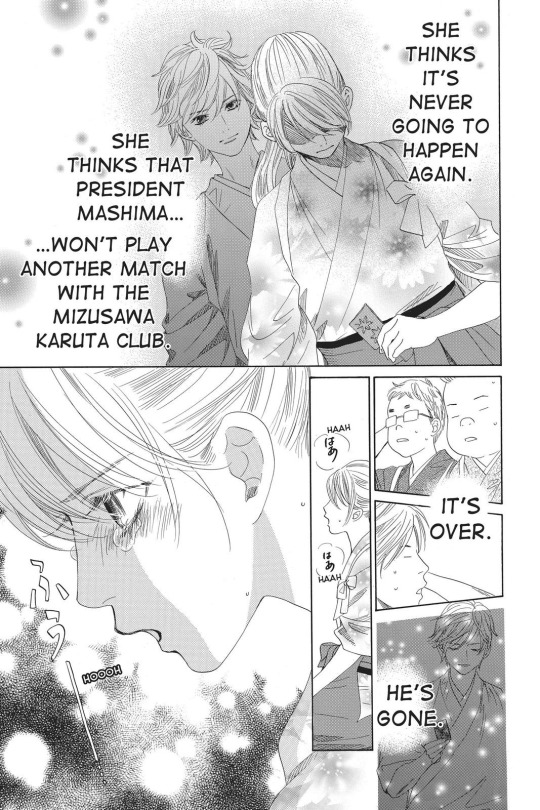
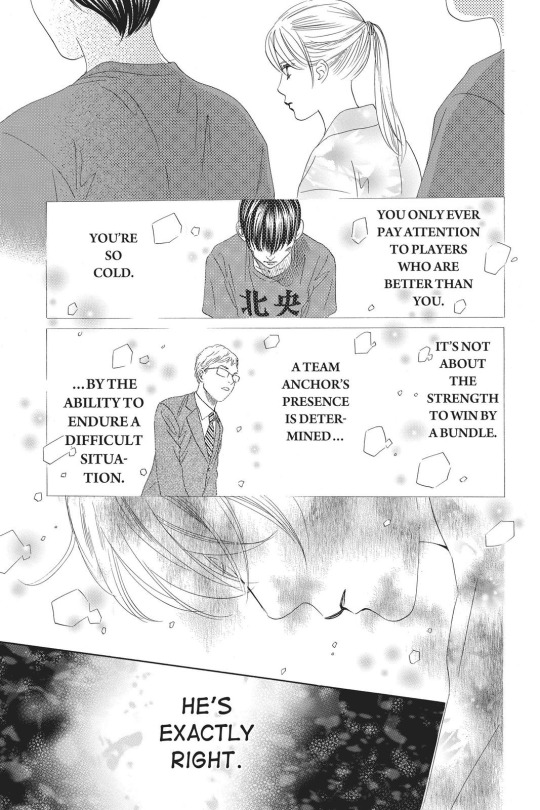
Retro plays Chihaya in the Mizusawa vs Hokuo match and tells her that she's cold because she "doesn't notice players below her". Despite him taking it back and saying her aiming for people who are 'strong but alone' isn't wrong, between his words and the words of the announcer talking about what makes a strong leader, it's clear that Chihaya agrees with the fact that she's "cold". She thinks of Taichi upon hearing the announcer's words and realizes that she didn't notice (or acknowledge enough) the qualities that he brought and how essential he was to the team's emotional strength. She thinks of him often in this part of the manga and seems to be noticing more and more the things that made Taichi, Taichi and how she often may have taken him for granted because he had simply always been there.
She continues to incorporate things that Taichi used to do when leading the team at nationals, telling Arata she "can feel his presence". When playing against Arata's team, she's so focused on her team that for most of the match she doesn't realize she's playing against Arata, the first time they've played since they were kids. She continues wearing Taichi's headband even after attributing her bad luck in the previous match to it, seeming to indicate she's emotionally supported by his presence and wants to include him. It's only when the dead 'Chiha' is read and she notices Taichi that her unbelievable concentration is broken and she realizes it's Arata she's playing. Taichi more or less lit up the room for her (sorry to be cheesy). After the match, Mizusawa members point out that it's the first time Chihaya immediately falls asleep after playing, as if Taichi simply there is enough for her to relax a bit.
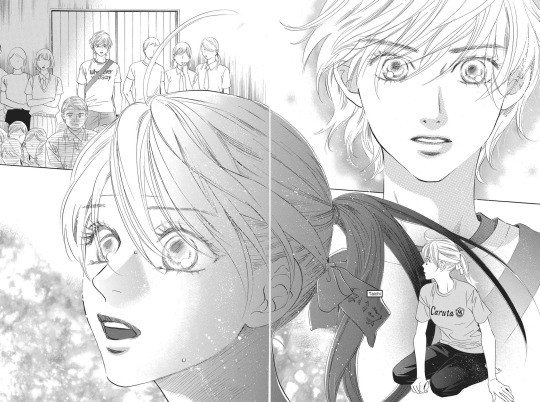
Beyond the fact that she was able to support the team, another moment where I feel like is proof of Chihaya's growth is when she goes after Porky after he loses to Arata in the Class A matches. It's a small interaction, but nice to see. She doesn't say much at first and seems to wait to see if he even wants to talk, and after he starts getting down on himself, she makes sure he hears exactly what her thoughts on his contributions are. She no longer gets mesmerized by players like Arata and Shinobu to the point that she forgets about her teammates until someone gets or updates her. She is now able to be there for her team and uplift them, making sure she actually tells them about how she values them and the work they've put in together. I'd also argue that her going to "answer" Arata is also proof of her realizing that hearing anything in regards to how she feels is better than nothing, something she probably learned from her inability to properly communicate with Taichi.
After the high school tournament, Chihaya does an extensive cleaning of the club room before she retires and is joined by Taichi, his first time back to that room since resigning. This chapter in general is one of my favorites (Desktomu's lines about their time being a treasure he never expected to have always gets me) but this is the first chapter where Taichi and Chihaya's relationship is seen after everything went down. In the club room, there's some awkwardness and it's clear Chihaya isn't quite sure what to say, and Taichi seems to have been trying to say something before being interrupted by the band students. Whether it was an apology or a "don't worry about me" in regards to her being cautious because of his feelings toward her, or something else entirely we don't know, but it seems obvious their relationship may be different moving forward.
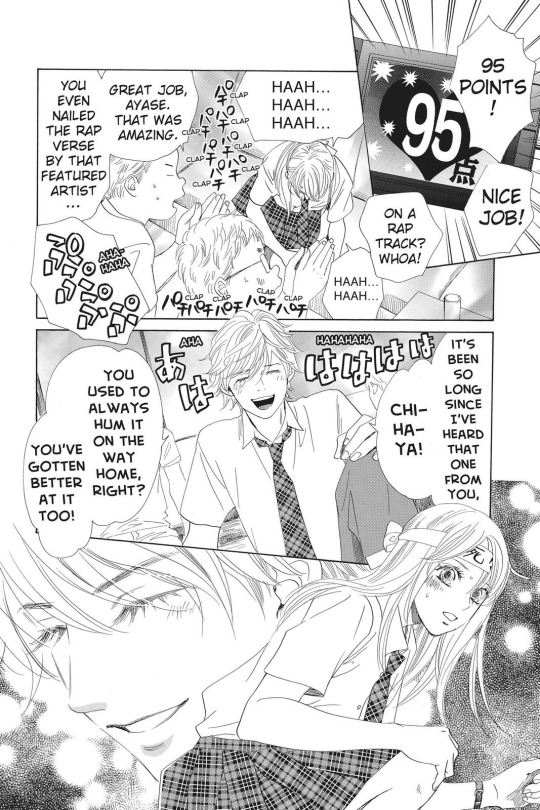
When they're at karaoke in the same chapter, Chihaya seems more conscious of Taichi. Her reaction to him genuinely having fun is sweet because I feel as though Chihaya may have been worried that she may never see that side of Taichi again (and another instance of him seeming to light up the room to her). Him helping clean and hanging out with the club members also seems to prove to Chihaya that he valued the time he spent with all of them, even if at one point they were a source of pain. The panels of Chihaya and Taichi back to back signify a couple things to me. They're facing opposite directions, a visual to show how their lives have taken them in different directions; they are no longer on the team together, practicing together, spending as much time together, etc. and yet they still support each other. Sudo even points out later that even though they're not how they once were, they were still inevitably connected to each other.
Chihaya also makes sure to thank Taichi after they watch the tv special and Taichi is able to articulate to Chihaya's mom why now is a good time for Chihaya to attempt becoming queen even though it causes friction with college entrance exams. Based on all the times she thought of Taichi after he left and her realizations of how much he did for her and the team, I feel as though her reiterating "Really, Taichi. Thank you." is more all-encompassing than just her gratitude for helping her mom understand.
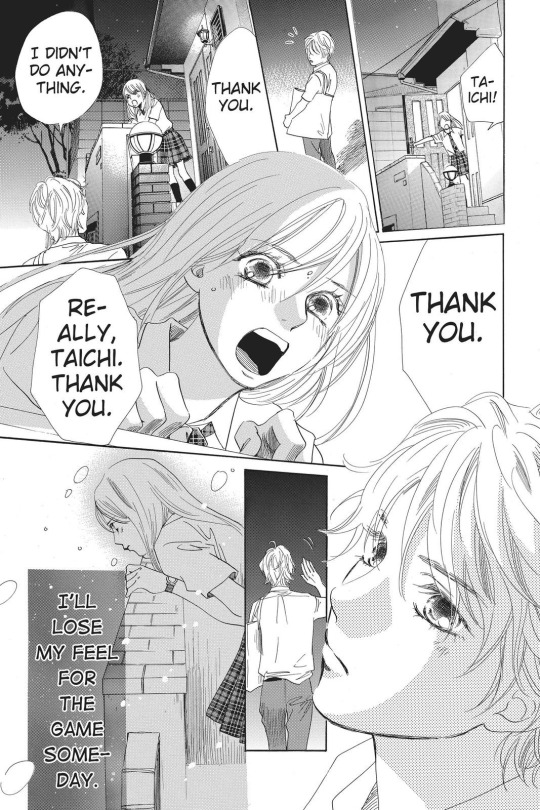
After this, we finally get to the part where Taichi comes back to playing karuta outside of his practice with Suou. This excites Chihaya and she is conscious of him many times in both the qualifiers and his matches with Arata to become the challenger ("Chiha helped Taichi? I'm so glad.", "It's fine as long as Taichi can take cards.", "Taichi's eyes told me to not let anyone take the s-sound cards."). It reminds her of the time they played on a team and supported each other and how hard they worked together (she cries when she sees that Taichi wore his Mizusawa shirt when he became the eastern rep). When Taichi loses to Arata, Kana looks at Chihaya and notes she was crying "bitter tears". Some people interpret this as Chihaya hoping Taichi would defeat Arata, even if only subconsciously. While possible, I've always though of it as being specifically because Taichi lost. They've worked hard together over the years, she recently thought that she'd lost her connection to him, and now while she continues on the path to accomplish her dream, she has to leave him behind (at least for this year). It also connects to Harada's line that "the three will become one and two by the end of the day" and now that Chihaya sees that, she can't help but cry. Again, I'm not sure I see it as her secretly hoping Arata would lose, but realizing that Taichi won't be going further with them this year and that breaking her heart.
Once the challenger matches are decided, Taichi and Chihaya don't see each much face to face. The last time we're shown that they do before the queen matches is when they give Taichi a futon for a night. Kana asks Taichi about his feelings for Chihaya and his response is that they may gradually fade. Initially, it's not known whether or not she heard this, but we'll circle back to that. When Chihaya visits a shrine for New Year's, she thinks about what she should ask her friends in regard to preparation for the queen match. When she gets to Taichi, she's at a loss for words and/or we as the audience don't see what answer she comes to. I've seen people say she may have just wanted to ask him to come and support, which based on other events doesn't sound all that unlikely in my opinion. The biggest reason I say this is the scene when she sees Taichi under the Omi Jingu shrine, smiling and praying. He's not actually there, but it does seem like she really wants him to be there. Right after this she thinks of the club praying there in their first year, but it's worth noting she specifically saw only Taichi, smiling in a very similar way as when she told her to become the strongest in the world when she became the challenger (also remember how badly she wanted him to smile previously?).
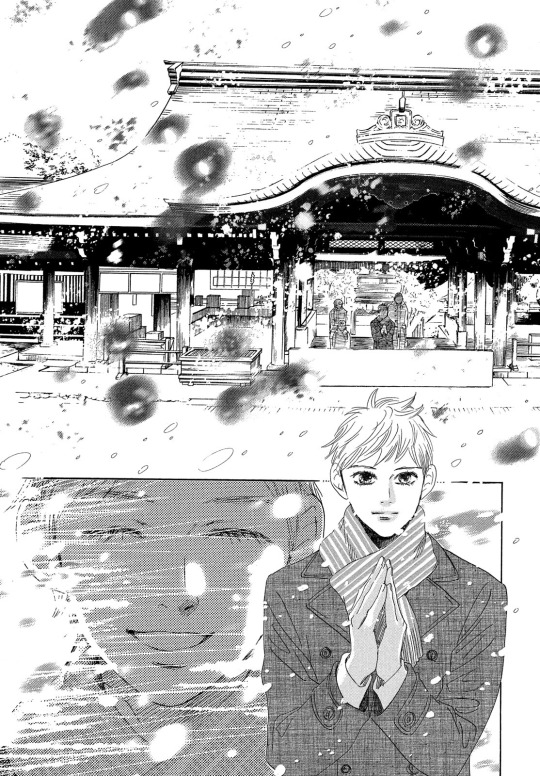
At the queen match itself, there are many times when she feels Taichi's support, directly and indirectly. Unbeknownst to her, he helped Chitose get her bag to her and his conversation with her seems to be a factor in her watching the matches at the end. Arata also resorts to essentially acting as Taichi to help motivate Chihaya, which to me is an acknowledgement on Arata's part that while he saw her take her first card and played her at her highest concentration, he hasn't been the one directly supporting her all this time (but some may not like that interpretation lol). She also gets flustered upon hearing Taichi texted Arata only to rush back for her phone and feel disappointed she didn’t get one.
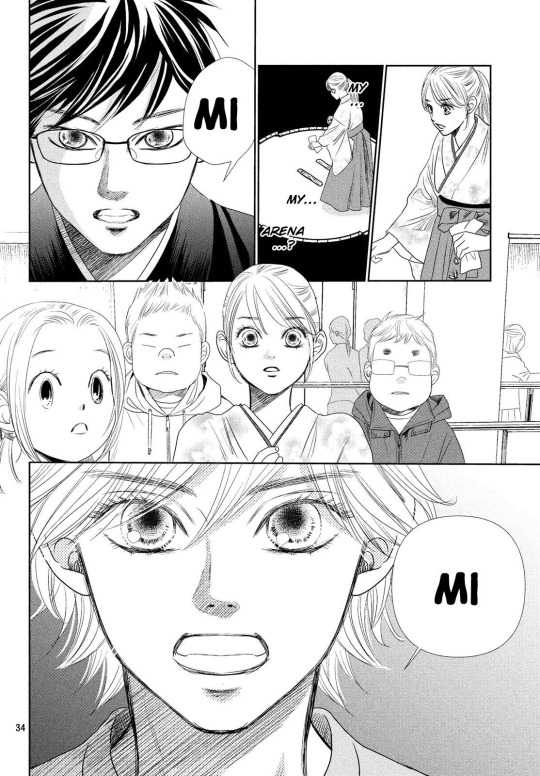
I also find it symbolic that Taichi is somehow attached to all three of her victories over Shinobu. Chihaya wins her first game with the 'Tare' card, one that she attaches to him because it was the poem being read in her headphones when Taichi found her in high school. The second win was taken after she realizes "Taichi has always been here", and fully acknowledges all the support she's felt from him, both in the time he directly supported her and the team as well as the indirect support in the lessons and pieces of advice he'd given her. The first time he walks in (during the fourth match), we see Chihaya remember Taichi's line to Kana about the possibility of his feelings eventually fading. This has always intrigued me (at first I didn't even know she'd heard that) because it seems to bother her or make her anxious, meaning she may subconsciously not want them to fade; she seems to be figuring out her own feelings. Afterward, she recalls the vision of him at the shrine, as if him now being there in person answered her own prayer.
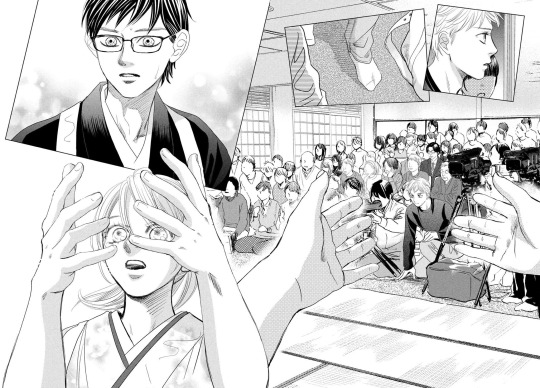
The third win is taken when the 'Tachi' card, Taichi's namesake card, is read. She specifically kept this card and once again very noticeably acknowledges his presence when he comes to watch (like I said, he seems to light up the room). After she wins and wakes up, she immediately notices his absence and celebrates after hearing that he's going to continue playing, with his eyes set on becoming Meijin.
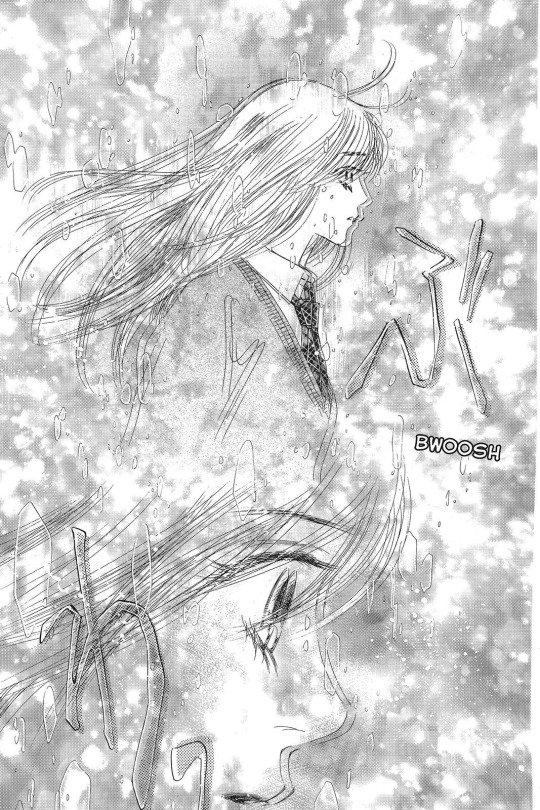
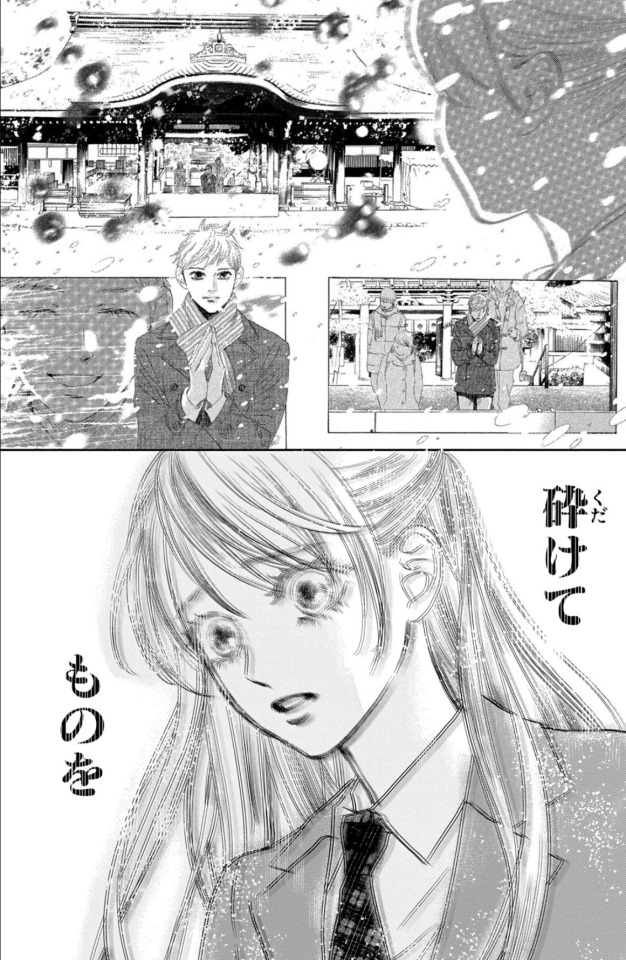
Finally, on their graduation day, she once again becomes a bit anxious after hearing that Taichi's plans for college are different that she assumed. When Desktomu uses the phrase "you're just his friend", she seems bothered and has a moment of realization that reminds me of the moment she truly realized Taichi loved her (the panel is from the extra pages in the final volume I believe, placed with flashbacks from throughout the series). Several moments come to her mind, as if asking herself why she wanted him to smile so desperately, why she felt so comforted and supported by his presence, and why she wanted him to be there so bad that she had a vision of him under such a symbolic place. It's then that she seems to fully comprehend that she would in fact interpret her feelings toward him as being romantic (the distorted effect over her in the panel is what reminds me of the moment from Taichi’s confession), and realizes she wants to tell him that. When she talks to him and is assured that they'll see each other again as long as they keep playing, Chihaya's reaction seems to say "that isn't enough anymore". Chihaya's confession is really well done in my opinion, and it uses parts of her character growth well; she's making sure her thoughts and feelings are conveyed properly (in this case even more so considering she heard Taichi say that his feelings may gradually fade).
Another long one and I feel like I didn't even say all I planned to, but thanks for reading if you got to the end!
55 notes
·
View notes
Text

a fem fukusaku doodle from yesterday <3
8 notes
·
View notes
Text
Look at this... 👀
Look at this... 👀 https://pin.it/1AynVjqtp
Sage Mode Naruto Uzumaki with Master Fukusaku 🥹🥹
1 note
·
View note
Text
I just didn't want to be a loser anymore.
- from Battle Royale (dir. Kinji Fukusaku)
0 notes
Text
Reader
(Grammar correction powered by DeepL Write)
1. Hutchinson R. (2019) 'Fukasaku Kinji and Kojima Hideo Replay Hiroshima: Atomic Imagery and Cross-Media Memory', Japanese Studies, available on: https://doi.org/10.1080/10371397.2019.1614882 [Accessed on 19 Nov, 2023]
This essay analyses how nuclear issues related to atomic blasts in World War II are reflected in Japanese media culture by examining two examples: the movie Battles without Honor or Humanity (1973) directed by Fukasaku Kinji and the video game Metal Gear Solid (1998) directed by Hideo Kojima. The essay will apply principles of academic writing including objectivity, clarity, logical structure, conventional formatting, clear and objective language, adherence to style guides, formal register, logical progression, balance, precise word choice, and grammatical correctness.
Particularly in Metal Gear Solid (1998), the director Kojima constructed an alternative virtual backstory that closely resembled real-life events occurring before the atomic bombing of Hiroshima during World War II. Kojima incorporated multiple cutscenes that portrayed the effects of an atomic blast, following Fukusaku's film. This reinforced the gravity of the deadly and potentially irreversible trauma, whilst emphasising the significance of duty for the protagonist.
Nevertheless, individuals from diverse cultural and political backgrounds harbour their own perceptions. Japanese artists, particularly those from close generations, associate the effects of nuclear trauma with their historical development. The story told by their elders, perhaps the longest-lasting and deepest cut of all, instills terror among citizens. The memories of atomic blasts, and the long-lasting radiation and wide-ranging burns on their lands, leave scars that endure.
So, it is important to carefully consider the perspectives of audiences from different backgrounds. Achieving resonance with the audience is key, resulting in a truly balanced and outstanding piece of work. This is especially crucial in a global market where varied perspectives are prevalent.
2. Allison A. (2000) ‘A Challenge to Hollywood? Japanese Character Goods Hit the US’, Japanese Studies, available on: https://doi.org/10.1080/10371390050009075 [Accessed on 20 Nov, 2023]
This article provides examples of various Japanese intellectual properties (IPs), such as Pokemon, Power Rangers, and Tamagotchi, and describes how they became popular beyond Japan in Euro-American regions. This phenomenon demonstrates that even though citizens' tastes may differ, creative and fresh ideas or works can captivate most people's attention and significantly increase the IPs' influence.
Although it may seem simple to attract a potential audience's attention with fresh ideas, this article was published at the dawn of the 21st century, a time when fertile ground lay ready for new ideas to sprout like bamboo shoots. Now more than 20 years have passed and artists worldwide have replicated and adapted the original ideas to suit their own perspectives. Despite the passage of time, creativity may have become trapped in a cycle for years on end. It is not easy to disassemble the conventions, but this may prove the true norm. Long-standing ideas have become the foundation for modern pop culture, and have been emulated countless times, thus strengthening the bond between artist and audience, rather than engendering competition between intellectual properties.
3. Loudoun F. M., Boyle B., Larsson-Lund M. (2023) 'Making choices in digital play spaces: Children’s experiences', Scandinavian Journal of Occupational Therapy, available on: https://doi.org/10.1080/11038128.2023.2271050 [Accessed on 20 Nov, 2023]
This essay reports on an experiment designed to investigate the aspects of gameplay that are most appealing to children, whether in a manual or digital format. The results demonstrate that the most engaging factor is the opportunity for children to make their own decisions. The essay explains that this is because children are less interested in following rules or instructions and are more attracted to the curiosity that arises from the consequences of their choices.
I suppose this theory holds true in the realm of gaming experience for adults. A prime example of this is the Open-world category of video games - a very popular genre, where players relish the opportunity to explore and experience their chosen direction, selecting their options independently and making choices without having to worry about real-life consequences. A prime example of this is the Open-world category of video games - a very popular genre, where players relish the opportunity to explore and experience their chosen direction, selecting their options independently and making choices without having to worry about real-life consequences. The design process is such that players are rewarded with surprises at every turn. Another example to consider is the extensive customization options available to players in games with a high degree of freedom. It is not uncommon for players to spend a significant amount of time fine-tuning their virtual characters, properties and items.
What is particularly inspiring is the challenging nature of developing such games, which requires a considerable team effort. However, excessive additions to the game can negatively impact optimization, hence material reuse is crucial. As for how to alleviate monotony stemming from duplicating content and produce innovative material beyond the original fundamentals, that appears to be a distinct challenge for other creative businesses.
4. Valdés-Miyares J. R. (2021) 'Beowulf’s Monster Discourse Now: Grendel in Twenty-First-Century Film' , English Studies, Volume 102 Issue 6, Phase 7, available on: https://doi.org/10.1080/0013838X.2021.1952678 [Accessed on 23 Nov, 2023]
This section of the essay provides examples from the Alien Series to compare with the movie Beowulf, in order to explore the creation of iconic and impressive monsters from outer space.
Although I have not watched Beowulf, as a fan of the Alien Series, I can appreciate the concept of creating the Xenomorph from the shape of humanoids. In the story of the movies or the scenes behind, Ridley Scott, the creator and director, clarifies that the deadly monster Xenomorph has an endless connection with humankind. This is the reason why people feel deep horror from the monster. People believe that there is an unseen barrier between their human shape and the monster, and their flesh could always be the cradle breeding the monster's terrifying form. (And of course thanks to the artist H. R. Giger who created it.)
For us concept artists, it is never too late to rethink about creating impressive and horrible concept from the shape, or even texture of our common race, human.
5. Cynthia, K. (2015) 'The Future is Female: Bateson, Benjamin and How Women Learn in Ridley Scott's Prometheus' , Anthropology Now, Volume 7 Issue 3, available on: https://doi.org/10.1080/19428200.2015.1103608 [Accessed on 18 Dec, 2023]
The article discussed about inspiration of feminism from Prometheus (2012), directed by Ridley Scott, and even other films of Alien Series.
As a rare movie series which always set female characters as protagonist or even heroines, Alien Series never avoid showing feminine elements, and continue to make some of them neutral at the same time. From my personal perspective, it is a great example to show the film industries that starting the story from females would never reduce the potential of storytelling, while the points of view from women's eyes are needed to be shown as more as possible at the same time, the industries need to be balanced with multiple eyesights.
Talking about Prometheus itself, it was a great breaking point to set a heroine, and set a inhuman, which is an android male, at the same time. The evil, but extremely intelligent, unpredictable android David as the villain achieved a great comparison with the normal mortal heroine Dr. Shaw, just like how the gender status still remains in the real life. And it was really tricky how the movie ended, none of them was defeated, but both survived and black and blue.
Trying to read a story from a reference of real life inspires us creating concept which reflects the ideas almost everybody thinks about.
6. Mee, L. (2021) 'Conjuring a Universe: James Wan, Creepy Dolls and Demon Nuns', Quarterly Review of Film and Video, Volume 40, Issue 2, available on: https://doi.org/10.1080/10509208.2021.1996311 [Accessed on 02 Jan, 2024]
This article examines how the Conjuring-Verse created by director James Wan is developed across various films.
Despite being directed by different individuals, the main creative team pays close attention to the production of the story's background. This results in not only intriguing comparisons between the same characters appearing or mentioned in different films, but also the occurrence of different events in the same time and space, as well as similarities in the background setting. The article highlights how different stories are developed in various directions by the same cause.
Wan is a pioneer of the Conjuring-Verse and a model of low-budget horror film production. This genre of horror film does not require a luxurious cast or elaborate set design, which is indicative of its typically low budget. Despite these limitations, directors such as Wan are able to create compelling stories with satisfying conclusions. The Conjuring-Verse is a prime example of this.
7. Beale, S. (2022) ‘Funny and disturbing: women’s serio-comic performances on the Victorian music hall’, Comedy Studies, available on: https://doi.org/10.1080/2040610X.2022.2091734 [Accessed on 02 Jan, 2024]
This article introduces local serio-comic productions with female themes in Victorian England. It explains how female creators and actors struggled with public opinion and promoted feminist thought.
Britain was one of the areas where the feminist movement first developed, and it has a rich cultural and entertainment scene. Female creators indirectly reveal the situation of women in The Times through drama and comedy. Women are frequently subjected to unfair treatment and prejudice in such situations, which is often taken for granted. The serio-comic genre elicits laughter while also prompting the audience to reflect on the absurdity that arises from serious reality. The relaxed genre carries the weighty burden of civilization.
8. Harper, G. (2023) ‘Artificial Creative Intelligence (ACI)’, Creative Industries Journal, available on: https://doi.org/10.1080/17510694.2023.2273127 [Accessed on 02 Jan, 2024]
This paper briefly discusses the evolution and value of Artificial Creative Intelligence (ACI) by combining numerical studies and theories. It highlights that technological developments have intensified the general population's reliance on computer automation technology, particularly artificial intelligence. This dependence is often due to the need for convenience, but also partly due to people's lack of knowledge in certain areas. AI is often used by those who require creative results but lack the corresponding creative ability.
The question of whether AI can replace human creativity has become a popular topic. However, it is important to note that the origin of creation is still human, as AI typically uses a pre-existing database or material library. Nonetheless, the origin of creation is still the human itself, and new creation can provide a steady stream of creativity for the field of literature and art. As long as copyright issues are taken into consideration. Technical support, such as ACI, is often just one step in a complete creative workflow. It provides references or efficiently collects material, while protecting copyright.
9. Warren-Crow, H. (2016) 'Screaming like a girl: viral video and the work of reaction', Feminist Media Studies, available on: https://doi.org/10.1080/14680777.2016.1234234 [Accessed on 03 Jan, 2024]
This article analyses the reasons behind the popularity of reaction videos, particularly those featuring female protagonists. The text is accessible to a broad audience, including those with cognitive disabilities or low reading literacy. Reaction videos can include responses to images, as well as challenges such as the 'ice water challenge' and eating videos.
The article notes that women's images, expressions, voices, and body movements tend to have a greater impact on viewers' senses. The text is grammatically correct, uses simple vocabulary, and follows a logical structure. The sentences are short and straightforward, and the active voice is used where possible. No changes to the content have been made. The target audience is not limited to heterosexual cisgender men seeking sensory stimulation. It is important to consider that the image of women is generally more widely accepted, which can positively impact the click rate on the network.
The article discusses how certain female image elements are linked to human physiological conditioning, such as the association with maternal impressions and the response of the human brain to the characteristic high pitch of the female voice. Exploring the human body can aid the visual creation process. For instance, it can help identify the most pleasing colour combinations, or the most striking combinations of positive and negative shapes and lines.
10. Dixon, W. W. (2017) 'The Ghost of Frankenstein: The Monster in the Digital Age', Quarterly Review of Film and Video, available on: https://doi.org/10.1080/10509208.2017.1313030 [Accessed on 05 Jan, 2024]
The article briefly introduces the changes made to the Frankenstein films. It explains how the image of Frankenstein, which was originally unique in film culture, has been repeatedly reimagined by different directors and artists, and how its appeal has evolved over time.
According to my personal taste, the most fascinating aspect of a movie series, particularly a monster movie series, is the way the image and theme change with time. This is especially true for antique IPs that are over 50 years old. The charm of Frankenstein lies in its alternative interpretation of the concept of 'living dead'. Frankenstein always has a mad and tragic 'creator' behind it, and a tragic story. From another perspective, if the image of Frankenstein is given enough intelligence in the story, it can be linked to philosophical questions such as 'the meaning of existence'. Therefore, it can be argued that the Frankenstein series is also a precursor to the story of the 'android', such like Blade Runner, or I, Robot.
0 notes
Text
Fukusaku's Yakuza classic presented for the first time on Blu-ray in the UK.
This film has all of his trademarks, kinetic camera, staccato editing and the grimy Mise en scene you would expect from Italian neo realist cinema or British Kitchen sink drama.
It's aged badly in its depiction of female characters however, as an allegory for otherness and the effects of post WW2 immigration from Korea, this is an interesting social document.
Japanese cinema of the 70s is one of its most interesting times. Kurosawa was still working, Tohei was still producing edgy films such as this, Sonny Chiba was at the height of his powers and this brand of genre cinema was being used to wrestle with Japan's place in the world.
It's a great film, here presented via a 2k scan of the negative. Radiance is becoming one of the most interesting independent Blu-ray labels in the market at the moment. I hope they get to give some HK titles this type of treatment. Well worth a purchase!
#radiancebluray #fukusaku #japanesecinema #yakuzacinema
instagram
0 notes
Text
ROUND 1, BRACKET A
27 notes
·
View notes